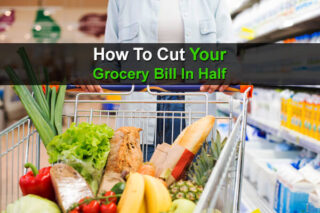Estimated reading time: 6 minutes
I’ve been searching for ways that I can bring locally sourced, healthy food to my community at a better price. Since I can’t really dictate the prices at the grocery stores, I’ve been searching for ways to feed my family and help my community.
Finally, I discovered an interesting solution: the food co-op. There are a lot of benefits to consider when you think about why you should join a food co-op.
In this article, we’ll talk about the benefits and drawbacks of joining a food co-op. We’ll look at the difference between a food co-op and a CSA, and we’ll talk about how you can find your local food co-ops as well as how you can start your own. But first, let’s talk about what a food co-op really is.
Want to save this post for later? Click Here to Pin It On Pinterest!
What Is a Food Co-op?
A food co-op is kind of like a grocery store that’s owned by the people who shop there. You pay a small fee to participate, but the members can then decide what foods or products are sold there and where they are purchased from.
Some food co-ops are only open to members, while others are open to everyone but give discounts to members. And some food co-ops require their members to volunteer a set number of hours each month, while others don’t.
Basically, a food co-op gives individuals who work together better buying power to purchase items at reduced prices, just like larger retailers can do. Some food co-ops may focus on healthier, organic produce or locally-grown produce. Other co-ops may focus on overstocked and discount items to make food cheaper and more accessible.
Some food co-ops look like a warehouse. You order online and then pick up your order. On the other hand, others are set up more like a typical grocery store, where you can walk around the store, meet people, and do your shopping.
Integrity and Value
Food co-ops follow a set of principles to maintain integrity and value, based on principles created by the Rochdale Society of Equitable Pioneers of Rochdale, England, in the 1940s. According to nashvillefood.co-op, they are:
- Open and voluntary membership. There is no discrimination, and member (ownership) is open to anyone who wants to participate.
- Democracy. All co-owners have an equal vote.
- Economic participation. Everyone contributes, and everyone benefits equally
- Autonomy and Independence. The co-op is owned by individuals, not corporations or investors.
- Education and training. The co-op provides education and training for everyone involved so they can all contribute meaningfully.
- Co-operation between co-operatives. Different co-ops work together both formally and informally.
- Concern for the community. The co-operative works with members' needs and concerns as well as for the good of the local community.
What are the benefits of a food co-op?
Food co-ops have plenty of benefits that might make it worthwhile for you to join. Here are a few:
Food co-ops can be better for the environment
- For example, food co-ops may make local and organic produce more available. Food travelling shorter distances may cut down on your carbon footprint.
- Local co-ops may be easier to access by bike or by foot because they can be located in residential areas.
- They can choose to provide food that uses less packaging, therefore creating less waste.
Food co-ops are better for people
- They may make certain products, such as fruit and vegetables, more affordable and available.
- They may help volunteers gain confidence and life experience.
- They help to bring people together for a common cause to make friends and revitalize communities.
Food co-ops may have financial and economic benefits
- Some food co-ops will save their members money, while others are more about providing better quality, high-value food at a reasonable cost.
- Food co-ops keep money in the local markets, which boosts the local economy.
- Food co-ops help support local farmers and can choose to use ethical suppliers.
What are the Drawbacks to Joining a Local Food Co-op
There aren’t many drawbacks to joining a local food co-op, but you might want to know what they are before you jump in. According to moneycrashers.com, you might want to know:
- The selection of items (especially non-produce) may be limited.
- Some items may be more expensive than at larger retailers.
- Offerings may vary throughout the season.
- There may be limited hours compared to your local big box store.
What’s the Difference Between a Co-op and a CSA?
A CSA is Community Supported Agriculture. This means you pay a farmer upfront to buy into a share of the season’s harvest as it becomes available. This could include fruits and vegetables, meat, eggs, dairy, or other farm goods.
There is some risk in joining a CSA because crops may fail, or you may have an overabundance of certain produce. The biggest difference here is that the farmer owns the co-op in a CSA, while in a food co-op, the members own the co-op.
How to Find Your Local Food Co-op
One way to find your local food co-op is just to ask around. Your friends, neighbors, and local farmers are a great way to start. You may even be able to do a Google search for local food co-ops. However, grocery.co-op will give you a great starting place! Click on the link, and then you can search by state for the co-ops closest to you.
How to Start Your Own Food Co-op?
If you don’t have a local food co-op, you may want to start one of your own!
Starting your own food co-op is a lot like starting a business or non-profit organization. Shareable.net gives the following suggestions to get started:
- Research
- Organize your committee
- Become a corporation
- Recruit members and divide up responsibilities
- Develop your business plan
- Get financial backing
- Start operating.
For an in-depth guide by the Univerity of Wisconsin- Madison on how to get started with your own food co-op, click here or visit this link for even more resources.
Final Thoughts on Food Co-ops
If you value locally sourced food, more sustainable products, and supporting your local economy, then a food co-op might be the right choice for you. There are lots of benefits to joining or even starting your own food co-op that make them well worth the time, energy, and cost.
Like this post? Don't Forget to Pin It On Pinterest!












